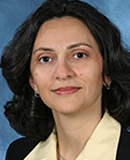Mahta Moghaddam elected Fellow of the IEEE
The grade of Fellow recognizes unusual distinction in the profession and is conferred upon a person with an extraordinary record of accomplishments.

 Enlarge
Enlarge
Prof. Mahta Moghaddam has been named an IEEE Fellow, Class of 2009, “for contributions to forward and inverse scattering techniques for radar remote sensing.”
Prof. Moghaddam received the B.S. degree (with highest distinction) from the University of Kansas, Lawrence, in 1986 and the M.S. and Ph.D. degrees from the University of Illinois, Urbana-Champaign, in 1989 and 1991, respectively, all in electrical and computer engineering. From 1991 to 2003, she was with the Radar Science and Engineering Section, Jet Propulsion Laboratory (JPL), California Institute of Technology, Pasadena, before joining the Radiation Laboratory at Michigan.
She has introduced innovative approaches and algorithms for quantitative interpretation of multichannel SAR imagery based on analytical inverse scattering techniques applied to complex and random media. She has also introduced a quantitative approach for data fusion by combining SAR and optical remote sensing data for nonlinear estimation of vegetation and surface parameters. She has led the development of new radar instrument and measurement technologies for subsurface and subcanopy characterization.
Dr. Moghaddam’s research group is engaged in a variety of research topics related to applied electromagnetics, including the development of advanced radar systems for subsurface characterization, mixed-mode high resolution medical imaging techniques, and smart sensor webs for remote sensing data collection and validation.
More recently, Prof. Moghaddam has been conducting research in the emerging interdisciplinary areas of environmental remote sensing, subsurface characterization, smart environmental sensor webs, and physics-based medical imaging. Each of these areas requires the development of state-of-the-art sensors as well as the statistical signal processing and physical models to characterize the sensors and their interaction with their intended environments.
More about IEEE Fellows:
According to IEEE, “the grade of Fellow recognizes unusual distinction in the profession and shall be conferred by the Board of Directors upon a person with an extraordinary record of accomplishments in any of the IEEE fields of interest. The accomplishments that are being honored shall have contributed importantly to the advancement or application of engineering, science and technology, bringing the realization of significant value to society.”
 MENU
MENU 
